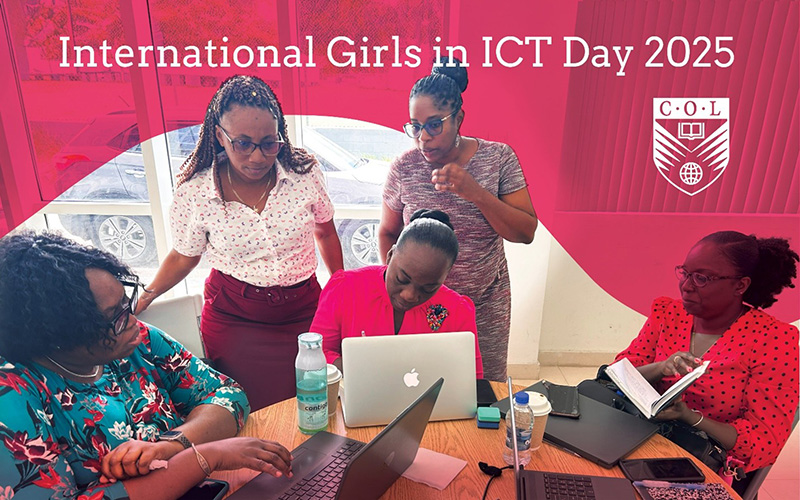
By Dr Karen Nyangara
COL Adviser: Gender
International Girls in ICT Day 2025 was celebrated on 24 April under the theme “Girls in ICT for inclusive digital transformation”. The day is observed to draw attention to the critical need for more girls and women in the ICT sector, according to UN Women.
Information and communication technologies are critical tools and resources for social change. Through their use, we can address society’s most significant challenges – climate change, emergent global health issues, conflict and poverty. Each of these issues intersects with and impacts men and women differently. Therefore, the solutions need to be framed considering a gender lens that allows both men and women to develop and use the technologies for creating a more sustainable and equitable future for all.
More girls and young women need to access ICT for education and training and their livelihoods. Some of the data on access looks promising. The 2023 Global Education Monitoring (GEM) report: Technology in education: a tool on whose terms? indicates that two-thirds of the poorest households in low- and lower-middle-income countries own a mobile phone, and that two-thirds of all people use the internet. Students in many countries are increasingly using technology to learn. However, teachers feel hampered by the lack of digital technology and training, and female role models in science, technology, engineering, and mathematics (STEM) are still lacking in many schools. Globally, only one-third of all STEM graduates from tertiary institutions are female. Despite advances in digital connectivity and technology-based training and education, girls and women remain underrepresented in the ICT employment sector.
The need to surmount the challenges in making ICT accessible and getting more girls and women interested in ICT-related careers needs to be underscored. The World Economic Forum Future of Jobs Report 2025 themed “The jobs of the future – and the skills you need to get them” shows that technological literacy, AI and big data, networks and cybersecurity are needed more rapidly than any other skills in the next five years, no matter one’s career path. For example, with commerce and finance increasingly online, entrepreneurs without good technological skills are disadvantaged in business and are more susceptible to cybercrime. Teachers play a central role in equipping students with foundational knowledge and skills through ICT and inspiring them to pursue careers in STEM.
By harnessing the potential of technologies for open, distant and lifelong learning, the Commonwealth of learning acts as a catalyst for the transformation of education. Through its Commonwealth Digital Education Leadership Training in Action (C-DELTA) programme, COL equips trainers with the skills to promote digital education and help other teachers integrate ICT in teaching and learning. Through the Virtual University for Small States of the Commonwealth (VUSSC) initiative, COL aims to strengthen mathematics education in the Caribbean, equipping teachers with innovative strategies to enhance student learning outcomes in mathematics.
As part of COL’s Teacher-in-the-Loop AI (Til-AI) project, COL’s regional centre, the Commonwealth Educational Media Centre for Asia (CEMCA), conducted a boot camp for mathematics teachers in India to leverage generative AI to design OER to teach challenging concepts in mathematics. The project also aims to increase girls’ participation in STEM. Under the Skills for Work Initiative, COL works with national partners, Qualification Authorities (QA) and TVET institutions to build capacity of practitioners for blended TVET practice, using technology for authentic assessment, skilling, reskilling and upskilling. COL’s GIRLS Inspire initiative conducts training in eMobile course development for NGO trainers to curate training materials targeting young women in community education, financial literacy, entrepreneurship, and farming.
Empowering teachers and trainers in formal and non-formal institutions to use technology in teaching increases personalisation and interaction of the learning experience. Students taught by these teachers develop digital literacy, can access a wider range of learning resources, and are motivated to use technology daily. COL’s work is rooted in inclusive digital transformation, which can only result in more girls taking up ICT-based careers and livelihoods.


